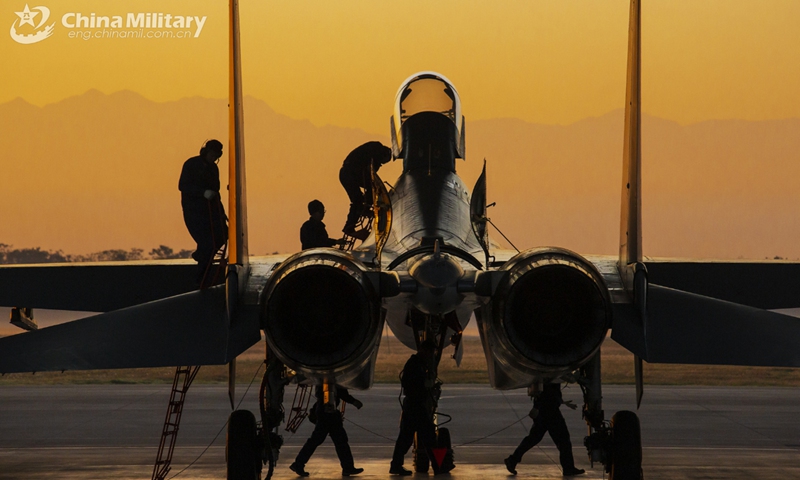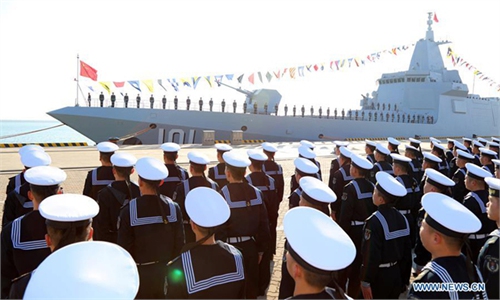China emphasizes Taiwan question, South China Sea issue in resumed defense policy coordination talks with US
Communications lower risks of misjudgment; differences remain: analysts

Ground crew assigned to an aviation brigade with the air force under the PLA Eastern Theater Command inspects a fighter jet during a flight training exercise. The training was conducted in early December to enhance the pilots' flight skills. Photo:China Military
China and the US resumed the previously suspended defense policy coordination talks with a meeting this week, in which the Chinese side stressed its positions on the Taiwan question and the South China Sea issue, as well as maritime and air security issues.Although differences remain and cannot be resolved anytime soon, such talks can lower the risks of misjudgments which will prevent escalating accidents into conflicts, experts said on Wednesday.
The 17th China-US Defense Policy Coordination Talks was held in Washington from Monday to Tuesday, China's Ministry of National Defense (MOD) said in a press release on Wednesday.
It marks the first meeting of the Defense Policy Coordination Talks since the annual talks were suspended after then-US house speaker Nancy Pelosi provocatively visited the island of Taiwan in August 2022, observers said.
The Chinese side said that China is ready to develop healthy and stable military ties with the US side on the basis of equality and respect, and work together to implement the important consensus related to military affairs reached by the two heads of state during their meeting in San Francisco in 2023, the MOD press release reads.
Zhuo Hua, an international affairs expert at the School of International Relations and Diplomacy at Beijing Foreign Studies University, told the Global Times on Wednesday that the latest meeting is a reflection of smooth progress in China and the US' gradual resumption of military exchanges.
The defense policy coordination talks came after senior officials of the two militaries' joint staff departments had a virtual meeting in December 2023. It is an indication that other military communication channels, including Military Maritime Consultative Agreement meetings, telephone conversations between theater commanders and meetings between defense ministers could also resume soon, marking the complete resumption of the two militaries' exchanges at all levels, Zhuo said.
Song Zhongping, a Chinese military expert and TV commentator, told the Global Times on Wednesday that direct communication between the two countries' militaries are conducive to preventing misjudgments, which could cause unpredictable conflicts and frictions that bring tremendous harm not only to the two countries, but also to peace and stability in the region.
As long as the US aims to maintain its global hegemony, it is unrealistic to expect the US to make fundamental changes, and China needs to maintain high vigilance in safeguarding its own national security, Song said.
This means it is vital that the two militaries manage differences and defuse crises should they arise, Song said.
In the meeting, the Chinese side urged the US side to take seriously China's concerns and take more actions that are conducive to the development of the two countries' military relations, according to the MOD press release.
The Chinese side stressed that China will not make any concessions or compromises on the Taiwan question, and demanded that the US side abide by the one-China principle, implement relevant commitments, stop arming the island of Taiwan, and not support "Taiwan independence."
The Chinese side urged the US side to reduce military deployments and provocations in the South China Sea, and stop supporting infringing, provocative actions by a certain country.
The US side should fully recognize the root cause of maritime and air security issues, strictly discipline its frontline troops, and stop sensationalizing and hyping relevant issues, the Chinese side said.
The Chinese side also elaborated China's stern positions and major concerns on issues concerning China's core interests and international hotspot issues.
According to a readout on the talks published by the US Department of Defense, the US side highlighted the importance of maintaining open lines of military-to-military communication "in order to prevent competition from veering into conflict."
While the US side reiterated the US' commitment to its one-China policy and reaffirmed the importance of peace and stability across the Taiwan Straits, it also claimed that the US will "continue to fly, sail, and operate safely and responsibly wherever international law allows," and accused China of repeatedly harassing Philippine vessels in the South China Sea.
Analysts said that China repeatedly made its core interests and red lines clear in communicating with the US, and the US will have to understand that if it insists on making provocations in those aspects, China will have to take resolute measures to resolve the questions.
A Beijing-based military expert who requested anonymity told the Global Times on Wednesday that the remarks from the Chinese side and the US side show that there are still many differences, which is normal given that the military serves politics, and as long as the US is determined to strategically contain China, military exchanges between the two countries will only have limited effects. This is to avoid misunderstanding and misjudgment as much as possible, and prevent potential accidents and their escalation into conflicts, analysts said.
China-US military relations still face uncertainties, and there might be frictions from time to time, but the two major countries must shoulder their responsibilities in managing differences to safeguard peace and stability, the expert said.




